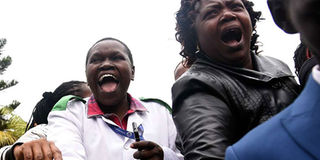Deception, fraud, graft risk for universal health coverage

Nurses at Kenyatta National Hospital in Nairobi start their strike over pay on September 9, 2019. Governments in Africa emphasise putting in place legal claims to adequate healthcare. PHOTO | EVANS HABIL | NATION MEDIA GROUP
What you need to know:
- Ignoring social determinants of human health may cripple the collective resolve to achieve the original dream of UHC.
- Corruption casts a major threat to the goal of health coverage for all and impedes poverty reduction.
For many people in Africa, getting quality healthcare is a choice between staying healthy and slipping into poverty.
And more than ever before, the healthcare options that the lower class can afford are besmirched by corruption and fraud — the proverbial “oldest foe”.
Corruption casts a major threat to the goal of health coverage for all and impedes poverty reduction, quality education and even climate action and makes the healthcare inadequate and exorbitant.
The renowned Nigerian writer Chinua Achebe once theorised that this culture of acquisition and retention of absolute power, wealth and privilege at any cost thrives in Africa because the system makes it “easy and profitable”.
It is so deeply entrenched in our public psyche that some of the accused are willing to commit the atrocities to whittle down the investigations.
SUSTAINABLE GROWTH
In Malawi, there was talk of a Cabinet minister setting the office ablaze to stop investigations that touched on the official.
In Kenya, the fight against the vice has been interpreted to mean it is targeted at particular ethnic communities.
Meanwhile, Transparency International — polemics over its method apart — has consistently rated African countries as the most corrupt on earth, urging the building of stronger institutions as the first prerequisite in dealing with sleaze.
Moreover, there is a consensus among constitutional experts that in the interest of weeding out corruption wherever it occurs in society, it is vital to ensure the independence and accountability of the Judiciary to provide legitimate and effective redress.
Universal health coverage (UHC) is a necessity for sustainable development, which is consubstantial with a global healthcare regime in which households are relieved of any financial risk and which enhances their access to quality healthcare and affordable medicines.
SUPPORT
The concept was in place even before the inception of the Sustainable Development Goals.
The World Health Organisation (WHO) regards it as the “single-most powerful concept that the public health has to offer”, and that offers “the enjoyment of the highest attainable standard of health”, and that it should be applicable to human beings “without distinction of race, religion and political belief, economic or social condition”.
The African Union has prioritised the implementation of UHC by 2030.
The World Bank and the Global Fund have both opened their ‘financial bandwidths’ to support the initiative, with Kenya donating a whopping $5 million (Ksh519 million) towards the continent-wide implementation.
Governments in Africa emphasise putting in place legal claims to adequate healthcare.
KEY STEPS
However, experts have sounded the alarm that ignoring social determinants of human health, including better housing, quality education and proper sanitary conditions, may cripple the collective resolve to achieve the original dream of universal health coverage, some of which includes bolstering institutional organisation and financing of the healthcare system.
However, it will be interesting to see how UHC overcomes the chaotic bottlenecks put in its way by a culture of deception and corruption.
We can still recall that, in 2016, Kenya adopted a Master Plan to “galvanise the efforts and synergies” to eliminate neglected tropical diseases by 2020.
To date, the plan is yet to translate to effective actions structured on strong measures to strengthen investment in investigation, detection and tracking of these diseases, identification of their etiologic agents and their modes of transmission, and the creation of prevention and control strategies.
ACTION PLAN
Maybe the International Peace Institute was right when, in 2011, it published a report on the scale of corruption in Kenya, "Termites at Work: Transnational organised crime and state erosion in Kenya".
The report said that the Kenyan state is held captive by endemic corruption and powerful transnational criminal networks who are “hollowing out state institutions, thereby rendering them impotent”, and as a result the nation is porous to “smuggled drugs, counterfeits and other illicit commodities”.
How we will throttle down our appetite for the “old foe” to continue earning the trust of the funding bodies who have shown an interest in the “UHC project” remains a matter of conjecture.
Mr Onyango is a junior life scientist. [email protected]




